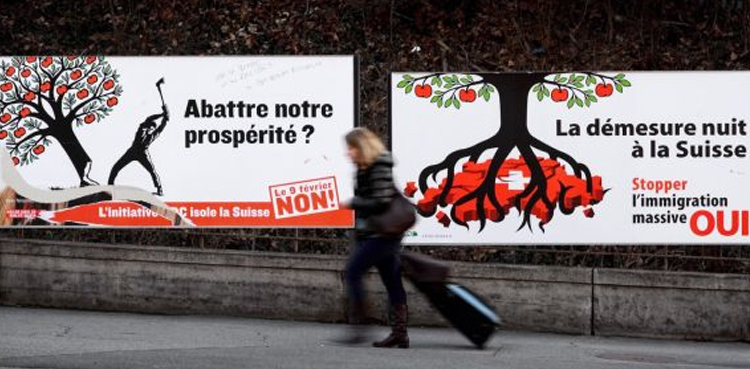GENEVA: The Swiss will in May vote on a proposal that could dramatically limit immigration from the EU, six years after a similar referendum nearly destroyed relations with the bloc.
The Swiss government announced Wednesday that the so-called “limitation initiative” would be one of the issues on the ballot for the year’s second round of popular votes, on May 17.
The initiative, backed by the populist rightwing Swiss People’s Party (SVP) and opposed by the government, calls for the country to revise its constitution to ensure it can autonomously handle its immigration policy.
SVP, Switzerland’s largest party, has built its brand by condemning immigration as well as the influence of the European Union in non-EU-member Switzerland.
If the initiative passes, Swiss authorities would have one year to negotiate an end to its 1999 agreement with Brussels on the free movement of persons between Switzerland and the bloc.
The initiative goes even further than a similar initiative, also backed by SVP, that was voted on in February 2014. It demanded that Bern impose quotas on migration from EU countries.
That vote narrowly passed, throwing Swiss-EU relations into disarray, with Brussels warning that any curbs on immigration by EU citizens put in doubt a whole range of bilateral agreements.
SVP condemns compromise as ‘betrayal’
Bern struggled for years to find a way to respect the will of the people without permanently alienating the neighbouring EU, its main trading partner.
After lengthy negotiations, the agreement reached in late 2016 stopped far short of an initial plan to impose quotas on resident permits issued to EU citizens, which Brussels had fiercely rejected.
Instead Bern opted to merely require Swiss employers to jump through a few bureaucratic hoops before hiring from the bloc, and to prioritise Swiss job seekers, at least ostensibly.
SVP condemned that compromise as a “betrayal” and a capitulation to the EU.
The upcoming vote in May is part of Switzerland’s direct democracy system, in which voters cast ballots on a wide range of national, regional and local issues every few months.
Any initiative to modify the constitution that gathers 100,000 signatures is put to a popular vote, while 50,000 signatures are enough to call a referendum opposing a law voted by parliament.
Other questions on the May ballot will be whether childcare costs should be tax-deductible, and one on opposition to a recent revision of Switzerland’s federal hunting law, which conservationists say does not go far enough to protect wildlife.



Leave a Comment